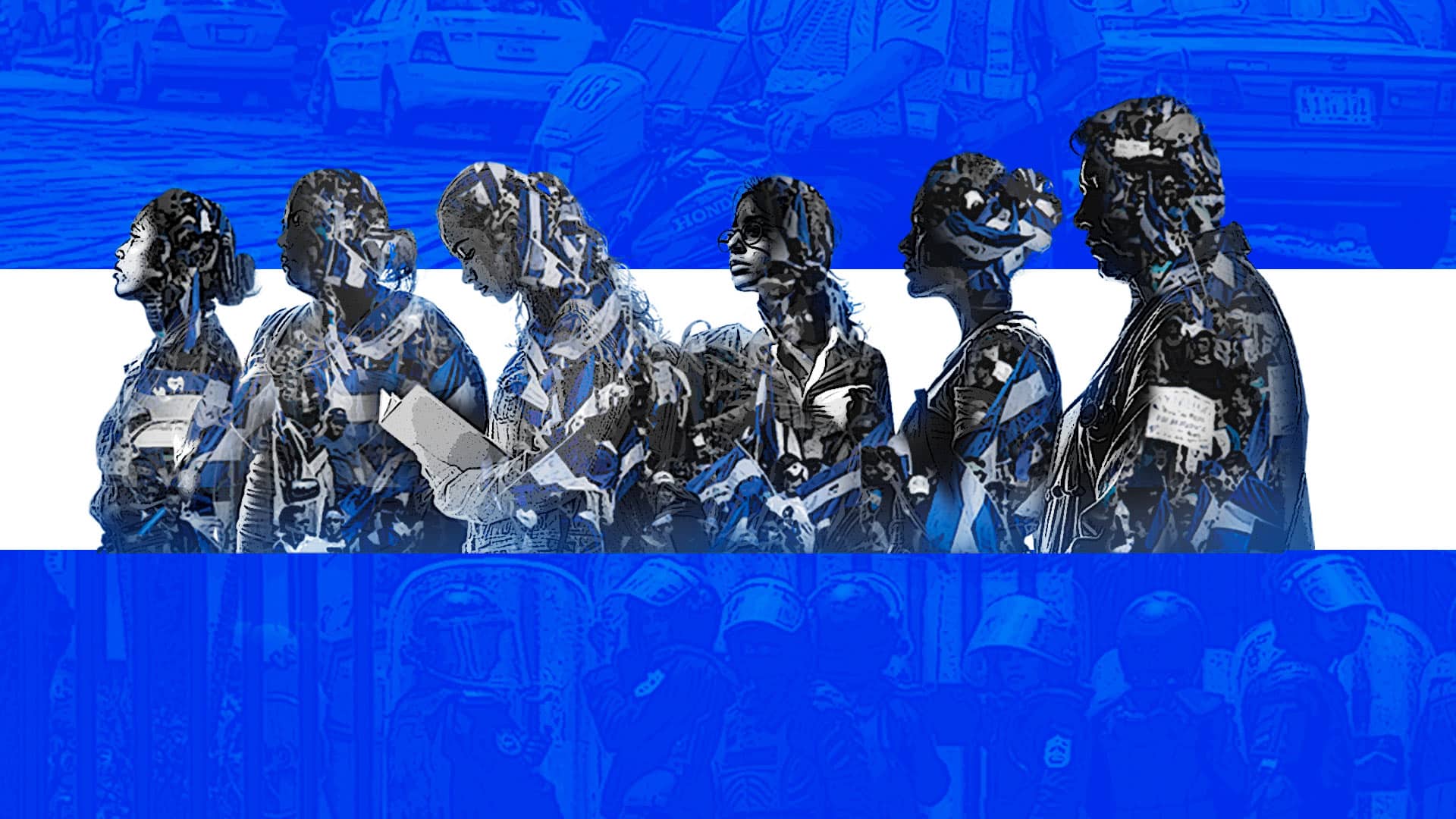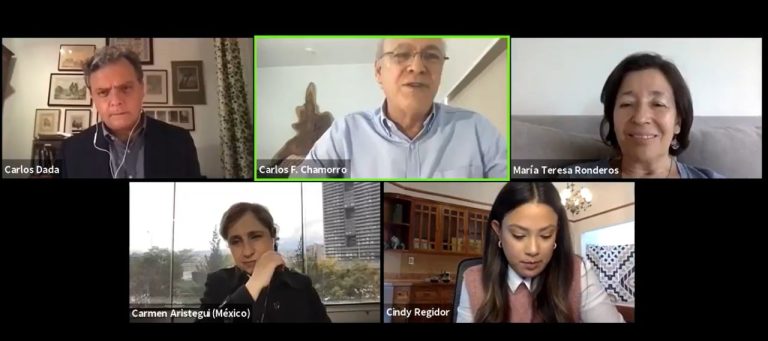26 de noviembre 2021

Six Years With April in Tow: Life Under Nicaragua's New 'Normal'

PUBLICIDAD 1M
PUBLICIDAD 4D
PUBLICIDAD 5D
Latin American journalists celebrate CONFIDENCIAL’s 25th anniversary

Journalists Carlos Dada, from El Salvador, María Teresa Ronderos, from Colombia, Carmen Aristegui, from Mexico, and Carlos Fernando Chamorro, from Nicaragua, warned that especially in Central America, journalism faces a situation of “survival” and “permanent resistance” in the face of the emergence of regimes and the consolidation of totalitarian dictatorships, which see freedom of the press as an obstacle.
“Central American journalism is in a state of survival right now, in the trenches in order to be able to continue working in the face of attacks coming from all sides,” says journalist Carlos Dada, director of El Faro.
The professionals agree that “good journalism is always an obstacle to power” since it demands accountability, reveals human rights violations, demands that responsibilities be assumed and shows how power is exercised. In this context, they warn that the profession faces a “permanent resistance” as it is strongly persecuted, even more so when the rule of law has been lost in a country.
The communicators participated in the webinar “Authoritarianism, democracy and journalism in Latin America”, organized by CONFIDENCIAL on the occasion of its XXV anniversary. The participants also took the opportunity to express their appreciation for our director, Carlos F. Chamorro, and our editor of Nicas Migrantes, Cindy Regidor, who was in charge of moderating the virtual event, recognizing these years of “resistance” and “hard work”, together with the team of CONFIDENCIAL, Esta Semana, Esta Noche and Niú, despite the persecution, confiscation and criminalization led by the Ortega-Murillo regime.
Chamorro emphasized that when CONFIDENCIAL was formed in 1996, its objective was not to do “resistance journalism”, but in the last 14 years, the Ortega Murillo regime “forced us to resort to this permanent effort which is to do journalism under persecution, defending ourselves permanently”.
In Nicaragua, Chamorro points out, doing journalism is “extremely critical, not only because of the persecution against journalists” but also because of the blocking of sources of information, which worsened in recent months, following the imprisonment of presidential candidates, former ambassadors, territorial and peasant leaders, businessmen, human rights defenders, journalists, activists and politicians.
He emphasizes that in these 14 years, in which independent journalism in Nicaragua has suffered from the lack of access to public information, it has been essential “to cultivate the trust of people who work in the government, who are subject to censorship, but who are extremely important sources of information”.
He highlighted that this cultivation of sources has allowed the disclosure of information that the Ortega-Murillo regime has tried to hide, exemplifying the case of the coverage that CONFIDENCIAL has provided on the Covid-19 pandemic, in which it has been possible to reveal that the regime has hidden thousands of deaths related to the coronavirus, in spite of what it officially informs.
The journalist insisted on the importance for the population and journalists “not to accept self-censorship”, in order to continue telling stories, recording human rights violations, acts of corruption and actions that go against a democratic state and rule of law.
Journalist María Teresa Ronderos, director of the Latin American Center for Investigative Journalism (Clip), also warned about the difficulties for journalism to survive in dictatorships such as those in Nicaragua, Venezuela, Cuba, and in regimes that are taking shape, as in the case of El Salvador. However, she emphasized that part of the challenges of independent journalism, precisely in contexts that are hostile towards the profession, is “collaboration... which is what first allows people not to feel alone and not to censor themselves”.
She mentioned that the benefits of collaborative work among independent media are focused on ensuring that information is not lost, even when reprisals from powerful groups or the regime itself occur, and that when persecution and criminalization actions occur, there are also immediate solidarity networks.
Carmen Aristegui, director of Aristegui Noticias, also highlighted the importance of “developing this collaboration muscle more strongly” although she stressed that this must be in “favor of the audiences, in favor of those who want to exercise and have every right to exercise this right to information, who want to know”.
She affirms that the challenge for journalists is to reinvent themselves “precisely to continue doing rigorous, verified, intelligent investigations that allow them to knock on the door of the audiences”.
In addition, Aristegui indicates that the role of journalists is important not only for the purpose of verifying data and facts, but also because there is someone who takes charge of what is said, of what is published, which, she points out, “does not happen in the so-called social dialogue and cyberspace”.
“We are living in a moment in which we have to assert what it means to be a journalist and take responsibility for what one says, what one reports”, she stressed.
Dada pointed out that another of the situations faced by the independent media is that they compete under unequal conditions with propaganda machines of authoritarian regimes, “dedicated to disseminate lies”. However, he stressed that as professional journalists “we cannot compete in that same field, because the moment we enter that game we lose our reason for being, our nature, our capacity to be useful to our audiences with our journalism”.
In this sense, he stated that it is important to try to educate readers, users or audiences, so that they can also learn to detect which sources give them the closest thing to the truth, which pieces are verified, because, he warned, the information - wherever it comes from - when uploaded to the new platforms or to the social networks, “competes in those spaces exactly like all those troll machines and, basically, we leave our audiences or the readers or users of social networks before a matter of faith”.
The journalists agree that independent journalism also faces problems of economic sustainability, due to the lack of advertising guidelines, support from non-profit organizations, and the purchase of their products through subscriptions or memberships.
Dada affirms that in openly anti-democratic contexts, where journalists have no possible defense and are seen as enemies for scrutinizing power, it is also a disadvantage that their financing “is closing down, because it is difficult for someone to advertise in your newspaper when the regime has declared you their enemy”.
The journalist points out that in the face of the reduction of access to funds, restrictions of freedoms and constitutional rights, what is left for journalism, effectively, is “a society that will back us”.
In this context of difficulties regarding economic sustainability and in hostile situations for press freedom, Ronderos advised that the media should opt for “a mix of things”, among which she mentioned: non-traditional subscriptions, memberships that connect audiences as part of the media they support, creation of additional business that can sustain the media and events in which journalists can participate, disclosing and explaining the investigations that the media carries out to a certain amount of their audience for a fee.
The expert emphasizes that a fundamental part of the mix, in addition to the options mentioned above, is philanthropic support, from people with clean capital who believe in the freedom of the independent press and grant money so that it can continue to be exercised.
“All these things combined help, but I believe that philanthropic support during such critical moments like the ones we are living through in El Salvador, Nicaragua, Colombia, Honduras, Cuba, Venezuela, would help the media sustain itself”, she said.
This article was originally published in Spanish in Confidencial and translated by our staff
Archivado como:
PUBLICIDAD 3M
Confidencial es un diario digital nicaragüense, de formato multimedia, fundado por Carlos F. Chamorro en junio de 1996. Inició como un semanario impreso y hoy es un medio de referencia regional con información, análisis, entrevistas, perfiles, reportajes e investigaciones sobre Nicaragua, informando desde el exilio por la persecución política de la dictadura de Daniel Ortega y Rosario Murillo.
PUBLICIDAD 3D